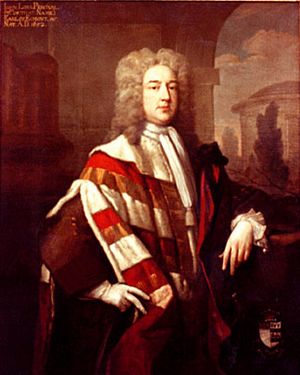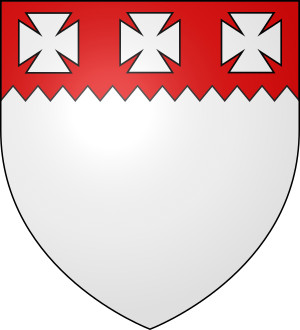John Perceval, 1st Earl of Egmont facts for kids
Quick facts for kids
The Earl of Egmont
PC FRS
|
|
|---|---|

John Perceval, 1st Earl of Egmont
|
|
| Member of the Dublin Parliament for County Cork |
|
| In office 1703–1715 Serving with
|
|
| Preceded by |
|
| Succeeded by | |
| Member of Parliament for Harwich |
|
| In office 1727–1734 Serving with Sir Philip Parker, Bt
|
|
| Preceded by |
|
| Succeeded by |
|
| Personal details | |
| Born | 12 July 1683 Burton, County Cork, Ireland |
| Died | 1 May 1748 (aged 64) London, England |
| Spouse | Catherine Parker |
| Children | 7, including John |
John Perceval, 1st Earl of Egmont (born July 12, 1683 – died May 1, 1748), was an important politician from Ireland and England. He held several titles during his life. These included Sir John Perceval, Lord Perceval, Viscount Perceval, and finally, the Earl of Egmont. He was also a member of the Privy Council of Ireland and a Fellow of the Royal Society.
Contents
Early Life and Family
John Perceval was born in Burton, County Cork, Ireland. He was the second son of Sir John Perceval, 3rd Baronet, and Catherine Dering. His family had owned land in Ireland and England for many years.
John's father passed away when John was only two years old. In 1691, he became the fifth Baronet after his older brother died. His mother also passed away the following year. John went to Westminster School in London and then to Magdalen College, Oxford. However, he left college without finishing his degree.
Political Career and Achievements
In 1703, John Perceval was chosen to represent County Cork in the Irish House of Commons. This was like being a member of parliament in Ireland. The next year, he joined the Irish Privy Council, a group of advisors to the monarch.
He was re-elected for County Cork in 1713. In 1715, he was given the title Baron Perceval. This meant he became a member of the Peerage of Ireland, a special group of noble people. Later, in 1722, he was made Viscount Perceval.
In 1727, Lord Perceval was elected to the British House of Commons for Harwich. He served there until 1734. He also worked as a Recorder (a type of judge) for Harwich. In 1733, he received an even higher honor, becoming the Earl of Egmont in the Peerage of Ireland. He was also a Fellow of the Royal Society, which means he was recognized for his contributions to science.
Founding the Georgia Colony
In 1728, he joined a group in Parliament looking into prison conditions. He became good friends with James Oglethorpe, who led this group. In 1730, they helped create a group that later became the Trustees for the Establishment of the Colony of Georgia in America.
In 1732, King George II approved a plan for the Georgia colony. Lord Egmont became the president of the Georgia Trustees. He and Oglethorpe worked together to create a detailed plan for settling the colony. This plan is now famous as the Oglethorpe Plan. He worked very hard to help Georgia grow, giving his money, time, and influence. He even kept a detailed diary of the Trustees' activities.
Diary and Family Life
His Diary
Lord Egmont kept a diary that is very important for understanding the history of Parliament in the 1730s and early 1740s. It gives us a lot of information about what happened during those times.
His Family
Lord Egmont married Catherine Parker in 1710. They had seven children together, but only three of them lived to be adults.
- John (1711–1770), who became the second Earl of Egmont after his father.
- Catherine (died 1748), who married Thomas Hanmer.
- Helena (1718–1746), who married Sir John Rawdon.
Lady Egmont passed away in 1749. Lord Egmont died in London in May 1748, when he was 64 years old. His oldest son, John, took over his title as the second Earl of Egmont. John's seventh son, Spencer Perceval, later became a Prime Minister of Great Britain.
See also
 | Janet Taylor Pickett |
 | Synthia Saint James |
 | Howardena Pindell |
 | Faith Ringgold |


